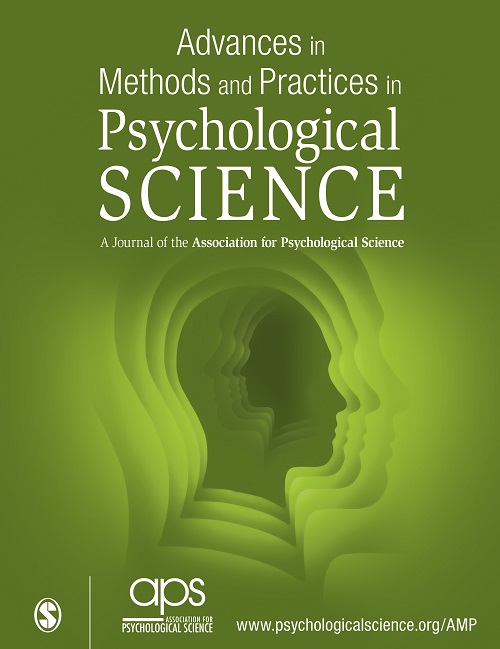How Do We Choose Our Giants? Perceptions of Replicability in Psychological Science
IF 15.6
1区 心理学
Q1 PSYCHOLOGY
Advances in Methods and Practices in Psychological Science
Pub Date : 2021-04-01
DOI:10.1177/25152459211018199
引用次数: 6
Abstract
Judgments regarding replicability are vital to scientific progress. The metaphor of “standing on the shoulders of giants” encapsulates the notion that progress is made when new discoveries build on previous findings. Yet attempts to build on findings that are not replicable could mean a great deal of time, effort, and money wasted. In light of the recent “crisis of confidence” in psychological science, the ability to accurately judge the replicability of findings may be more important than ever. In this Registered Report, we examine the factors that influence psychological scientists’ confidence in the replicability of findings. We recruited corresponding authors of articles published in psychology journals between 2014 and 2018 to complete a brief survey in which they were asked to consider 76 specific study attributes that might bear on the replicability of a finding (e.g., preregistration, sample size, statistical methods). Participants were asked to rate the extent to which information regarding each attribute increased or decreased their confidence in the finding being replicated. We examined the extent to which each research attribute influenced average confidence in replicability. We found evidence for six reasonably distinct underlying factors that influenced these judgments and individual differences in the degree to which people’s judgments were influenced by these factors. The conclusions reveal how certain research practices affect other researchers’ perceptions of robustness. We hope our findings will help encourage the use of practices that promote replicability and, by extension, the cumulative progress of psychological science.我们如何选择我们的巨人?心理科学中的可复制性感知
关于可复制性的判断对科学进步至关重要。“站在巨人的肩膀上”的比喻概括了这样一个概念,即当新的发现建立在以前的发现之上时,就会取得进步。然而,试图以不可复制的发现为基础,可能意味着浪费大量的时间、精力和金钱。鉴于最近心理科学的“信任危机”,准确判断研究结果的可重复性的能力可能比以往任何时候都更重要。在本注册报告中,我们研究了影响心理科学家对研究结果可复制性的信心的因素。我们招募了2014年至2018年间发表在心理学期刊上的文章的通讯作者来完成一项简短的调查,要求他们考虑76个可能影响研究结果可重复性的特定研究属性(例如,预注册、样本量、统计方法)。参与者被要求对每个属性的信息增加或减少他们对发现被复制的信心的程度进行评级。我们检查了每个研究属性对可复制性平均置信度的影响程度。我们发现了影响这些判断的六个合理而不同的潜在因素的证据,以及人们的判断受这些因素影响程度的个体差异。结论揭示了某些研究实践如何影响其他研究人员对稳健性的看法。我们希望我们的发现将有助于鼓励使用促进可复制性的实践,进而推动心理科学的累积进步。
本文章由计算机程序翻译,如有差异,请以英文原文为准。
求助全文
约1分钟内获得全文
求助全文
来源期刊
CiteScore
21.20
自引率
0.70%
发文量
16
期刊介绍:
In 2021, Advances in Methods and Practices in Psychological Science will undergo a transition to become an open access journal. This journal focuses on publishing innovative developments in research methods, practices, and conduct within the field of psychological science. It embraces a wide range of areas and topics and encourages the integration of methodological and analytical questions.
The aim of AMPPS is to bring the latest methodological advances to researchers from various disciplines, even those who are not methodological experts. Therefore, the journal seeks submissions that are accessible to readers with different research interests and that represent the diverse research trends within the field of psychological science.
The types of content that AMPPS welcomes include articles that communicate advancements in methods, practices, and metascience, as well as empirical scientific best practices. Additionally, tutorials, commentaries, and simulation studies on new techniques and research tools are encouraged. The journal also aims to publish papers that bring advances from specialized subfields to a broader audience. Lastly, AMPPS accepts Registered Replication Reports, which focus on replicating important findings from previously published studies.
Overall, the transition of Advances in Methods and Practices in Psychological Science to an open access journal aims to increase accessibility and promote the dissemination of new developments in research methods and practices within the field of psychological science.

 求助内容:
求助内容: 应助结果提醒方式:
应助结果提醒方式:


